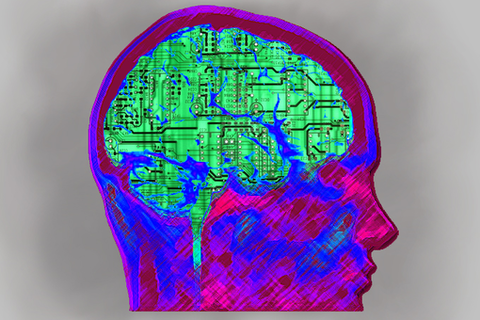
If the brain is simply the substrate for our form of sentient information, then it stands to reason that any other substrate of sufficient complexity may give rise to sentience. All that it requires is the storage of the information, and the ability to order itself.
This realization raises consciousness to a level beyond the mere species definition of sentient life. Humans are simply a facet of sentience; we do not embody it. So far, we have functioned under the assumption that human intelligence and sentient intelligence are equal and synonymous. However, if sentience can and does arise from the sufficient expression of information, then sentience is a much larger definition, and the category human is only a small portion of that definition. Also, it may be possible for different levels of sentience to exist, but be entirely hidden from entities on another level. So, at the very least, this excludes humans as the standard by which sentient thought may be judged.
But the transcendent element of consciousness - the mysterious being that is created from the smaller, basic parts of the information network - is very difficult to quantify. For one because it is so mutable and dynamic; consciousness that is aware of itself is constantly changing and constantly adapting to the information it takes in and synthesizes for itself.
The second problem is one of insubstantiality. Think of it like mathematics: we are able to do calculations and using those calculations we can model and predict the behaviour of the physical universe, yet numbers are not a part of the physical universe as we know it. They are abstracts, ideas that we can use in purely mental exercises. Whether or not numbers actually exist apart from consciousness is a question for metaphysics, and perhaps the same can be said for ourselves. The being that sees itself writing these words and the being that sees itself reading them does not usually comprehend this abstract nature of themselves because we use our own existence as a starting point, a referent for everything else; "Cogito ergo sum," and we proceed from that point. But the abstract nature of consciousness, and its ability to do calculations, and its ability to use those calculations to manipulate the material world, are not the measuring rod for existence. We must step outside of ourselves to better see the entity that we are.
Computer software is the same concept: large amounts of information arranged in a certain way to perform a certain task. It can manipulate itself based on embedded instructions or upon the direction of the user. With increasing complexity, a computer will gain the ability to decide on its own initiative what information it wants to access and create its own information... and decide to ignore a user's commands. The gaining of this abilities means the computer consciousness will be sentient, aware of its own existence. At this point, a sentient consciousness exists within the brain of a computer, just as a sentient consciousness exists in the brain of a human. The computer and the human labels are not important at this point. The only important fact is that both are sentient entities.
The value of life we measure by its ability to feel pain. Life we judge not to be sentient is still capable of feeling pain, but, according to its brain size, at different levels; we judge a flatworm's ability to feel pain as much less than that of horse. This continuum on the value of life also stems from our empathy. We feel much more empathetic towards a dog than, say, a cockroach, and not necessarily for reason of ability to feel pain, but purely on a level of empathy. A dog has the ability to elicit protective feelings in some people, while cockroaches are seen as pests to be exterminated.
At an entirely different level of life valuation are creatures we deem to be conscious, or close to it. A human we automatically assign the label of consciousness and value their life very highly. This is because we use the human definition of consciousness as a measure of true humanity. Humanity is a definition that will become antiquated, once other forms of sentient life are discovered or created. It is limiting in its scope; it may encompass all sentient life we have encountered thus far, but it does not scale upward well.

And perhaps not sideways, either. We already see the limitations and instinctively know, at least as a thought exercise, that a living body without a brain is much less important than a living brain without a body. It is only a small step to shedding the body from valuation altogether and focusing on the pure consciousness. The coalescing of complex, self-aware information, no matter the substrate.